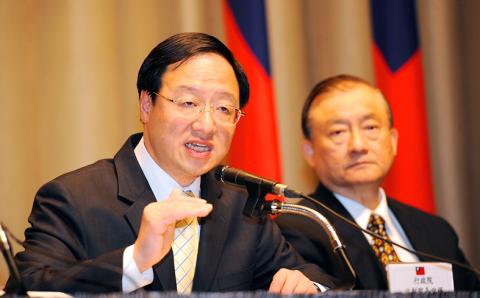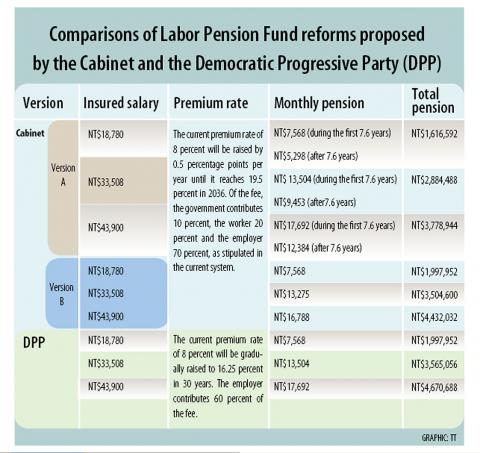Following criticism over its proposed changes to the Labor Pension Fund, which would see higher premium payments and lower payouts for private-sector workers, the Cabinet yesterday countered that the opposition’s proposal would place workers at a greater disadvantage.
In an interview with Hit FM radio early yesterday, Vice Premier Jiang Yi-huah (江宜樺), the architect behind the Cabinet’s reform proposal, said that he was “shocked” at the Democratic Progressive Party’s (DPP) proposal, which he said would “double the premium burden on workers compared with the Cabinet’s proposal.”
“Is that the DPP’s way of taking care of the working class?” Jiang asked.

Photo: Taipei Times
“I’ve read criticism in newspapers saying that our proposal would drive employees to death, but I was shocked when I saw the DPP’s proposal. Isn’t the DPP the one that’s trying to drive employees to death?” he asked.
Later, at a press conference at the Executive Yuan, Council of Labor Affairs Minister Pan Shih-wei (潘世偉) said the DPP’s proposal would put “the working class at a disadvantage, while giving capitalists a greater advantage.”
The Cabinet and the DPP on Wednesday unveiled their respective plans to reform the nation’s pension systems, which cover more than 10 million private-sector employees, military personnel, civil servants and public school teachers.

On labor pension reform, the Cabinet presented two proposals on the methods for calculating pension payments. However, premium payment would remain the same, with employers contributing 70 percent, the government 10 percent and employees 20 percent.
Under the DPP’s proposal, employers would be responsible for 60 percent of the insurance premiums and employees 40 percent, which the party said was “in line with international trends.”
Jiang cast doubt on the DPP’s formula, saying that exempting the government from the premium- sharing burden was “against the spirit of the pension scheme.”
The Labor Pension Fund is a social insurance, and therefore the government should be held to a certain level of responsibility to contribute to the premium; otherwise it would be commercial insurance, Jiang said.
Taking as an example an employee with an insured salary of NT$43,900, Jiang said that under the Cabinet’s proposal, the worker will have to contribute NT$1,712 per month to the fund when the premium rate rises to its highest level, at 19.5 percent, in 2036.
However, under the DPP’s proposal, the worker will have to pay NT$2,854 per month when the premium rate rises to its highest at 16.5 percent 30 years after the policy change. That is an additional NT$1,142 a month, or NT$13,704 a year, compared with the Cabinet’s proposal, he said.
“The DPP said our proposal would cut employees’ pension claims to a significant extent, but the DPP’s would impose a much heavier burden on employees,” he said.
Meanwhile, Pan said that the DPP’s proposal was designed “in favor of capitalists rather than employees.”
When the premium rate rises to 16.5 percent under the DPP’s proposal, companies will have to pay an extra NT$74.7 billion for their workers’ premiums, much lower than the NT$124.5 billion they would incur under the Cabinet’s proposed premium rate of 19.5 percent, Pan said.
DPP Chairman Su Tseng-chang (蘇貞昌) rebutted Jiang’s criticism of the ratio proposed by the DPP.
Su said Jiang “made negative comments without a complete understanding of the DPP’s proposal.”
The document released by the DPP shows that the party “recommended a 6:4 ratio to correspond to international trends,” adding that the ratios of various pension programs should be the same, but it would take “a dialogue between all involved parties to determine the final ratio,” Su said.
The DPP submitted the ratio after learning that the government was recommending a 5:5 ratio, which the DPP opposed, he said.
The government’s proposal would lower private-sector employees’ income replacement rate to between 30 and 40 percent, “which would leave workers with no choice but to commit suicide,” Su said.
Lin Wan-i (林萬億), executive director of the DPP’s think tank and the primary author of the proposal, reaffirmed that the party did not recommend a specific ratio and had always maintained that the ratio should be negotiated by all parties
On the government’s pension reform proposal, former premier Frank Hsieh (謝長廷) told reporters that the core issues should be the income replacement rate for public employees and the 18 percent preferential interest rate, but the government failed to address the issues, especially in regards to the preferential treatment for government officials with high incomes.
DPP Legislator Lee Ying-yuan (李應元) said the government’s proposal was not likely to clear the legislature without major adjustments because it failed to meet people’s expectations.
The government’s proposal appears to favor current public-sector employees while cutting the benefits of private-sector workers and future government employees as former civil servants who retired before 1995 will not be not affected by the proposed changes, Lee said.
Under the current government proposal, annual retirement payment for civil servants would be almost twice of those for private sector employees, Lee said.

‘ABUSE OF POWER’: Lee Chun-yi allegedly used a Control Yuan vehicle to transport his dog to a pet grooming salon and take his wife to restaurants, media reports said Control Yuan Secretary-General Lee Chun-yi (李俊俋) resigned on Sunday night, admitting that he had misused a government vehicle, as reported by the media. Control Yuan Vice President Lee Hung-chun (李鴻鈞) yesterday apologized to the public over the issue. The watchdog body would follow up on similar accusations made by the Chinese Nationalist Party (KMT) and would investigate the alleged misuse of government vehicles by three other Control Yuan members: Su Li-chiung (蘇麗瓊), Lin Yu-jung (林郁容) and Wang Jung-chang (王榮璋), Lee Hung-chun said. Lee Chun-yi in a statement apologized for using a Control Yuan vehicle to transport his dog to a

Taiwan yesterday denied Chinese allegations that its military was behind a cyberattack on a technology company in Guangzhou, after city authorities issued warrants for 20 suspects. The Guangzhou Municipal Public Security Bureau earlier yesterday issued warrants for 20 people it identified as members of the Information, Communications and Electronic Force Command (ICEFCOM). The bureau alleged they were behind a May 20 cyberattack targeting the backend system of a self-service facility at the company. “ICEFCOM, under Taiwan’s ruling Democratic Progressive Party, directed the illegal attack,” the warrant says. The bureau placed a bounty of 10,000 yuan (US$1,392) on each of the 20 people named in

The High Court yesterday found a New Taipei City woman guilty of charges related to helping Beijing secure surrender agreements from military service members. Lee Huei-hsin (李慧馨) was sentenced to six years and eight months in prison for breaching the National Security Act (國家安全法), making illegal compacts with government employees and bribery, the court said. The verdict is final. Lee, the manager of a temple in the city’s Lujhou District (蘆洲), was accused of arranging for eight service members to make surrender pledges to the Chinese People’s Liberation Army in exchange for money, the court said. The pledges, which required them to provide identification

INDO-PACIFIC REGION: Royal Navy ships exercise the right of freedom of navigation, including in the Taiwan Strait and South China Sea, the UK’s Tony Radakin told a summit Freedom of navigation in the Indo-Pacific region is as important as it is in the English Channel, British Chief of the Defence Staff Admiral Tony Radakin said at a summit in Singapore on Saturday. The remark came as the British Royal Navy’s flagship aircraft carrier, the HMS Prince of Wales, is on an eight-month deployment to the Indo-Pacific region as head of an international carrier strike group. “Upholding the UN Convention on the Law of the Sea, and with it, the principles of the freedom of navigation, in this part of the world matters to us just as it matters in the